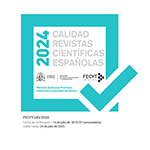Care, food security and vulnerable groups: integration from social work with families in times of pandemic, Santiago de Cuba, Cuba.
Abstract
The 2030 Agenda and the Sustainable Development Goals (SDGs) establish as a principle the need to "leave no one behind". Achieving these SDGs currently poses a challenge for care in the context of the pandemic, due to the social vulnerability that is signposted when caring for these groups, such as gender inequalities, aging and access to food. Access to food is made harder during lockdowns due to the marked vulnerabilities among many Latin American families. Cuba does not escape this reality; the active involvement of social work remains insufficient in the relationship between care, family food security and vulnerable groups.
This article is intended to assess the integration of food security, care and attention to vulnerable groups based on family-level social work actions during Covid-19 in the Santiago de Cuba municipal area. Scientific observation and surveys were used for the study, representing qualitative and quantitative methodologies.
The study findings generally show that social work with families must both foster cultural capital that makes it possible to redirect dietary practices in terms of caring for vulnerable groups, and reinforce family/social capital by facilitating greater links with institutions and organizations.
Downloads
Article download
License
In order to support the global exchange of knowledge, the journal Cuadernos de Trabajo Social is allowing unrestricted access to its content as from its publication in this electronic edition, and as such it is an open-access journal. The originals published in this journal are the property of the Complutense University of Madrid and any reproduction thereof in full or in part must cite the source. All content is distributed under a Creative Commons Attribution 4.0 use and distribution licence (CC BY 4.0). This circumstance must be expressly stated in these terms where necessary. You can view the summary and the complete legal text of the licence.









